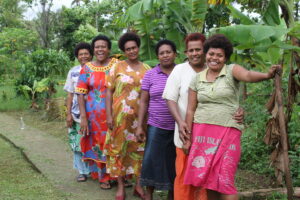Addressing Gender-based Violence in Environmental Conservation in Fiji
By Maddison Hall, Program Coordinator
In Fiji, a small island nation located in the South Pacific Ocean, there is an overwhelmingly high prevalence of gender-based violence (GBV). More than two in three women have experienced physical or sexual violence in their lifetimes – double the global prevalence of physical and sexual violence. Women often experience violence for years without receiving support due to the stigma associated with reporting, challenges in accessing services, and extensive delays to receiving justice.
“We find that key barriers [to reporting violence] include not knowing where to go, not having the information, the remoteness of location – which also creates barriers – the costliness of transport to the centers that provide the services, the complexity of filling in the forms and going into various offices, the stigma and discrimination in communities, and, somewhat, the role of the police also comes into effect.” – Key informant, Gender-based Violence and REDD+ in Fiji: Gender and Environment Analysis

With emerging evidence demonstrating the linkages between the environment and GBV, Marstel-Day and WI-HER have partnered to support the Government of Fiji to address gender-based risk in relationship to land use and conservation projects. Oftentimes, when we invest development dollars, we can create unintended consequences. For example, in an attempt to preserve natural resources in Fiji and provide access to benefits from land conservation to communities, we face a risk of disrupting power dynamics that are rooted in cultural norms and traditional practices. When power dynamics are disrupted and monetary benefits are introduced, conflict can arise among communities and families. The Fiji REDD+ Programme, partnering with USAID and World Bank, is committed to the principle of doing no harm. The Programme aims to incorporate accountability structures with protective mechanisms as part of its land lease development projects to allow equal opportunities for women and men to safely voice concerns or raise complaints.
“The biggest challenge to women’s rights] in Fiji and across the Pacific is the way we were brought up, in terms of the delineation of roles and responsibilities from an early age, where we were taught, ‘A man should be engaged in this, and women should be engaged in other activities.’ We grow up with it, and it’s hard to try to change these as people are growing up.”– Key informant, Gender-based Violence and REDD+ in Fiji: Gender and Environment Analysis
To enhance this protective mechanism, Marstel-Day and WI-HER engaged communities in Fiji to identify the challenges that should be addressed and how this mechanism can best empower women to fully access the benefits offered by the REDD+ Programme and incorporate protections that mitigate risks for GBV. Through our remote research during the COVID-19 pandemic, key informants from across Fiji, including in the rural areas where the REDD+ Programme is implemented, described gender norms and expectations about land use contributing to gender-based risk and GBV. These gender expectations, which we learned are strongly entrenched, dictate the appropriate roles and responsibilities for both men and women. For women and men who disrupt or challenge these expectations, they face potential consequences from their communities, families, and partners – up to and including violence.
“Women, as always, they are not in the frontline [of decision-making], even though they are the ones at the frontline facing the problems, the challenges of natural resource development. When there is a problem, it’s women that face the problem.” – Key informant, Gender-based Violence and REDD+ in Fiji: Gender and Environment Analysis
Using the knowledge and recommendations we have gained from our conversations with community members and key stakeholders and guided by WI-HER’s iDARE methodology, we will continue to work with our partners in Fiji to design localized solutions that protect women from gender-based risks and GBV. WI-HER remains committed to women across the globe in all countries and stands against GBV in all its forms. The importance of our work is particularly meaningful during the 16 Days of Activism against Gender-based Violence. WI-HER is committed not only to empowering women and protecting human rights and safety, but also to ensuring that our efforts and those of the global development community never unintentionally contribute to risks for GBV.
This activity has been made possible by the USAID Resilient, Inclusive, Sustainable Environments (RISE) Challenge, which funds efforts that prevent and respond to GBV across programs that address the access, use, control, and management of natural resources. We acknowledge USAID’s ongoing efforts to promote gender equality, empower women, and prevent GBV. WI-HER is a woman-owned small business led by President and Founder Dr. Taroub Harb Faramand. Dr. Faramand will share insights from her more than 35 years of experience in global development and leading USAID projects in a USAID RISE event during 16 Days of Activism. Register here to join the event and learn more about this project and the latest news about the USAID RISE Challenge.
To read more about the USAID RISE Challenge, visit their website.